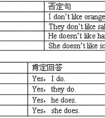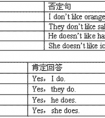Ann likes _____, but she can't _____ well. [ ]A. cook; cook B. to cook; cooksC. cooks; cooking D. cooking; cook -七年级英语
题文
| Ann likes _____, but she can't _____ well. |
|
[ ] |
| A. cook; cook B. to cook; cooks C. cooks; cooking D. cooking; cook |
答案
| D |
据专家权威分析,试题“Ann likes _____, but she can't _____ well. [ ]A. cook; c..”主要考查你对 实义动词,动名词 等考点的理解。关于这些考点的“档案”如下:
实义动词动名词
考点名称:实义动词
- 实意动词:
即行为动词,表示动作的动词。实义动词与系动词是相对的,能独立用作谓语。
它分为及物动词和不及物动词两种:
及物动词是指后面要求有直接宾语的动词;
不及物动词指后面不需要跟宾语的动词。 实意动词使用方法:
及物动词
后面必须跟宾语意义才完整的实义动词,叫做及物动词(transitive verb)。如:
I believe that the committee will consider our suggestion.我相信委员会将会考虑我们的建议。
“How long can I keep the book ?”Harry asked.哈里问:“这本书我可以借多久?”
Dr. Bethune set us a good example. 白求恩大夫给我们树立了好榜样。
Crude oil contains many useful substances.原油含有许多有用的物质。
不及物动词
本身意义完整后面不须跟宾语的实义动词,叫做不及物动词(intransitive verb)。如:
Birds fly.鸟会飞。
It happened in June 1932.这件事发生于一九三二年六月。
My watch stopped.我的表停了。
She spoke at the meeting yesterday evening. 她在昨天晚上的会上发了言。
兼作及物动词和不及物动词
英语里有不少实义动词可以兼作及物动词和不及物动词。这样的动词又有两种不同的情况
a)兼作及物动词和不及物动词时,意义不变。试比较:
Shall I begin at once?我可以立刻开始吗?(begin作不及物动词)
She began working as a librarian after she left school.她毕业后当图书馆管理员。(began作及物动词)
When did they leave Chicago?他们是什么时候离开芝加哥的?(leave 作及物动词)
They left last week. 他们是上周离开的。(left 作不及物动词)
b)兼作及物动词和不及物动词时,有时意义不尽相同。如:
Wash your hands before meals.饭前要洗手。
Does this cloth wash well? 这布经得起洗吗?- 英汉实意动词用法比较:
与汉语的比较,有时英语动词的及物和不及物的用法,与汉语的用法不一样,请注意下列两种情况:
a)有的动词在英语里只能用作不及物动词,而汉语则可用作及物动词,如arrive到达,agree同意,listen听。英语里这些动词后面常接介词。如:
We arrived at the railway station at noon.
我们于中午到达火车站。(at不能省去)
(比较:We reached the railway station at noon.)
Everybody listened to the lecture with great interest.
每个人都很有兴趣地听讲课。(to不可省去)
(比较:We all heard the lecture.)
Do they agree to the plan?他们同意这个计划吗?(to不可省去)
b)有的动词在英语里能用作及物动词,而在汉语里则不能用作及物动词,如serve为…服务。
Our children are taught to serve the people wholeheartedly.
我们的儿童被教以全心全意为人民服务
用于be动词之后,实义动词之前。 实意动词的用法:
肯定句:
主语+动词过去式+其它
否定句:
主语+助动词didn‘t+动词原型+其他
一般过去式:
Did+主语+动词原型+其他
考点名称:动名词
- 动名词:
如果一个动词加上了ing变成了名词,那么这个词称动名词。 动名词是一种兼有动词和名词特征的非限定动词。
它可以支配宾语,也能被副词修饰。
由于动名词是由动词变化而来,它仍保留着动词的某些特征,具有动词的某些变化形式,用以表达名词所不能表达的较为复杂的意念。
动名词的名词特征表现在它可在句子中当名词来用,作主语、宾语、表语、定语。 动名词的结构和形式:
动名词的否定结构:
动名词的否定结构由not 动名词组成。如:
Trying without success is better than not trying at all. 实验没有成功也比不实验好。
He hated himself for not having work hard. 他悔恨自己没有用功。
I’m sorry for not having telephoned you before. 很抱歉,没有早给你打电话。
He felt sorry for not having done the work well. 他为没有把工作做好感到难过。
I fancy it has done you a lot of good not going. 我看不去对你倒好了。
(not going 是动名词一般式的否定形式)
There is no denying the fact that he si diligent.
(no denying 也是动名词一般式的否定)动名词复合结构:
通常情况下,动名词的逻辑主语为谓语动词的主语。如果动名词动作的发出者不失谓语动的主语时,则需要有自己的逻辑主语物主代词或名词所有格加动名词就构成了动名词的复合结构,这种结构在句中可以作主语,宾语等。
(1)逻辑主语是有生命的名词作主语时,必须用名词或代词所有格,作宾语时(尤其在口语中),也可用名词普通个或人称代词宾格。如:
Do you think my going there will be of any help?
你看我去会有什么帮助吗?(宾语)
The student’s knowing English well helps him in learning French.
这位学生通晓英语对他学法语很有帮助。(主语)
Do you mind my(me) smoking ? 你介意我抽烟吗?(宾语)
They insist on Mary’s (Mary) going with them there.
他们坚持要玛丽跟他们一起去那儿。(介词宾语)
(2)逻辑主语是无生命名词是,通常只用名词普通格。如:
Do you hear the rain pattering on the roof?
你听见雨点打在屋顶上了吗?
Is there any hope of our team winning the match ?
我们对赢得比赛有希望吗?
(3) 逻辑主语是指示代词或不定代词this that , somebody , someone , nobody, none, anybody, anyone 时,只用普通格。如:
She was woken up by somebody shouting outside.
她被外面喊叫的人吵醒了。动名词的形式(一般式,完成式和被动式):
(1) 动名词的一般式所表示的动作与谓语动词所表示的动作同时发生,或在谓语动词表示的动作之后。如:
We are very interested in collecting stamps. 我们对集邮很感兴趣。
His coming will be of great help to us . 他来对我们大有帮助。
但是有些明确表示时间的动词和介词 after, on,upon, 或for之后,常用一般式代替完成式,表示动作发生在谓语动作之前。如:
I shall never forget seeing the Great Wall for the first time.我永远不会忘记第一次看到长城的情景。
On hearing that bad news , the mother couldn’t help crying. 一听到这个糟糕的消息,母亲就禁不住哭了起来。
Excuse me for coming late. 我来晚了,请原谅。
Thank you for giving us so much help. 谢谢你给了我们这么多帮助。
(2) 动名词的完成式所表示的动作或状态在谓语动词之前完成或结束。
He regrets not having taken part in the work. 他后悔没有参加这项工作。
We were praised for having finished the work ahead of time. 我们因提前完成了这项工作而受到了表扬。
(3)动名词的被动式:当动名词的逻辑主语是行为承受者时,用被动语态。如:
- 最新内容
- 相关内容
- 网友推荐
- 图文推荐
| [家长教育] 孩子为什么会和父母感情疏离? (2019-07-14) |
| [教师分享] 给远方姐姐的一封信 (2018-11-07) |
| [教师分享] 伸缩门 (2018-11-07) |
| [教师分享] 回家乡 (2018-11-07) |
| [教师分享] 是风味也是人间 (2018-11-07) |
| [教师分享] 一句格言的启示 (2018-11-07) |
| [教师分享] 无规矩不成方圆 (2018-11-07) |
| [教师分享] 第十届全国教育名家论坛有感(二) (2018-11-07) |
| [教师分享] 贪玩的小狗 (2018-11-07) |
| [教师分享] 未命名文章 (2018-11-07) |


![How much does it ______ to fly from Yancheng to Hainan Island?[ ]A. cost B. payC. spend D. take-七年级英语](http://www.00-edu.com/d/file/ks/4/2/shiyidongci/2020-01-05/small7dcf2f05998de63e10cc3629787031c81578210087.png)

![He always _____TV in the evening. He _____ listening to the radio. [ ]A. watch, don't like B. watches, doesn't like C. watching, don't like D. watch, do-七年级英语](http://www.00-edu.com/d/file/ks/4/2/shiyidongci/2020-01-05/small45d599b4a60b84e61cec210bfbf051f51578214524.png)
![I'd rather ___ to the Mcdonald's Restaurant because I like to listen to quiet music.[ ]A. to go B. going C. go D. went-八年级英语](http://www.00-edu.com/d/file/ks/4/2/shiyidongci/2020-01-05/small1767bba1727fef2c035c53dcbd9bc20e1578209517.png)
